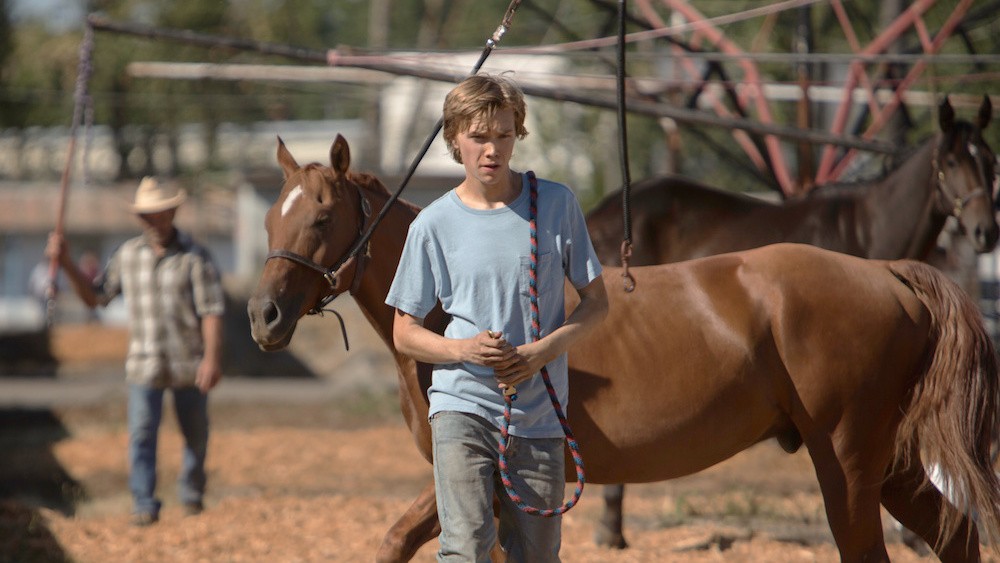Despite what you may have gathered from the movie poster or the trailer, Lean on Pete is definitively not a horse movie. Sure, certain aspects feel plucked directly from Black Stallion, Black Beauty, or even Where the Red Fern Grows, but the real focus of the story is on Charley (Charlie Plummer), the disadvantaged teenage protagonist, and more broadly on the harsh, grimy life of the working class in the Pacific Northwest. Don’t expect any glamour shots of horses galloping along the beach – this film is set in stables, in diners, in crumbling industry towns, as well as in The Great Outdoors.

Charlie Plummer in Lean On Pete
The film is visually beautiful, with the palette of a faded photograph and a keen use of light and shadow. Even in the dingy bars and cheap motels of his world, Charley’s face always seems to find the light. Plummer is incredibly engaging as Charley, his candid face speaking volumes as he descends from a hopeful kid into a hardened, desperate drifter. Charley’s journey brings drop-ins from Steve Buscemi, Chloë Sevigny, Steve Zahn, and Travis Fimmel, whose performances are (mostly) convincing as a few of the drunks, crooks, and thieves who populate this dark underworld.
Charley befriends Lean on Pete, the horse who seems to be the only other soft creature in a hard place. Despite being reminded several times that Pete is “not a pet, just a horse,” he becomes Charley’s only friend and confidant, and eventually his traveling companion, as they abandon the world they know in pursuit of home and happiness. What Charley seeks is simple: he tells Pete “the nicest place he’s ever been” was a friend’s house where the family “just laughed and talked….and they liked each other.” The vision of comfort fuels these two outsiders on their exodus through the rugged terrain of Oregon toward Wyoming. When boy and horse trudge across the dry land, they are dwarfed by the expanse of flat plains and sky, giving the audience feelings of insignificance and isolation experienced by our heroes. It’s a metaphor, just like the horse is a metaphor, employed by director Andrew Haigh to tell a story about poverty and class. (You might be saying, “What’s a meadow for?” and you’d be right, seeing as we never see poor Pete the horse graze or canter joyfully in one for the entire 120 minute duration. In fact, Pete might actually be a camel, considering the amazingly small amount of water he consumes on his trek across the desert.)
Lean on Pete introduces viewers to the third class citizens of an impoverished, modern America, although there are very few details letting us know that this is a contemporary story. Charley and his associates don’t own cell phones or computers; they drive busted old trucks, listen to the radio, and watch tube televisions. It’s jarring when we see a cell phone or hear an autotune-style pop song; by making these ubiquitous cultural symbols feel alien, the filmmakers successfully show us just how disparately different classes live, despite the myths the comfortable tell ourselves. Through Charley, we experience the cruelty, violence, and trauma of poverty, and the rage and PTSD that come with it. Overall, the effect is powerful, but there are some moments that dip a little too far into cliche territory, and at times, the story relies on unnecessary cheap shots to evoke strong emotions. But if you’re looking for a film to tug your heartstrings and make you feel like you’ve walked a hundred miles in some scrappy shoes, Lean on Pete will be right up your (sad, dark) alley.
Lean On Pete